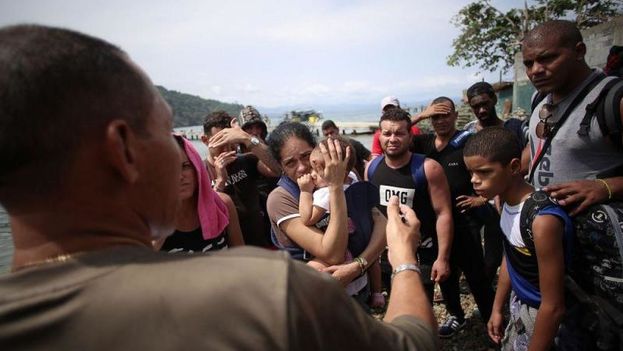
![]() 14ymedio, Pedro Campos, Havana, 4 December 2015 – Cubans wanting to leave the country for the United States found in Ecuador’s visa waiver a chance to undertake the journey by different routes, but basically traversing a continent via Colombia, Panama, Costa Rica Nicaragua, Honduras, Guatemala and Mexico.
14ymedio, Pedro Campos, Havana, 4 December 2015 – Cubans wanting to leave the country for the United States found in Ecuador’s visa waiver a chance to undertake the journey by different routes, but basically traversing a continent via Colombia, Panama, Costa Rica Nicaragua, Honduras, Guatemala and Mexico.
Nicaragua’s recent decision to close passage to some thousands of Cuba who made it Costa Rica from Ecuador, and to require visas from the island’s nationals who enter their country, has created an immigration conflict in the region and temporarily closed the doors to Cubans who want to go to the United States via this route.
Have Cuba, Nicaragua and Ecuador taken into account the many regional implications of these decisions? Let’s look at some of them.
In Costa Rica there are hundreds of thousands of Nicaraguans. In Central America, traditionally the borders are not strictly controlled for the thousands of natives of the region who move informally in the border areas.
Is Nicaragua aware that it is setting up eventual immigration-border conflicts in a region that is experiencing a peaceful era among neighbors, after decades of political violence? Does this attitude have any relationship with Nicaragua’s intentions to create a new inter-ocean canal in open opposition to the one in Panama? Have they thought about how violent repression of Cubans could affect future relations between the two countries?
Has Ecuador noticed that its measure complicates life for thousands of Cubans who aspired to leave Cuba by this route, and that it has affected the supply of clothes, shoes, costume jewelry and other products for thousands of self-employed Cubans who life of this market, and that any Ecuadorian suppliers will also suffer the consequences? Has Ecuador considered the affects on Cuban families in both countries? Has Ecuador thought about the effect of taking this measure on future relations between both countries?
Is the Cuban government behind these decisions by Nicaragua and Ecuador, two of its allies on the continent? Are Nicaragua and Ecuador aware of what this means?
And, lastly, have Cuba, Nicaragua and Ecuador taken into account all the regional consequences that could derive from these actions and situations, including the complications in the Straits of Florida, the relations between Cuba and the United States and others possible between the United States and those two countries for contributing to an eventual complication on its southern border, should a stampede of Cubans heading to the United States by sea develop, which could be considered a threat to the national security of the U.S.?
Does Cuba’s looking for the elimination of the Cuban Adjustment Act divert attention from its disjointed internal situation or is it a complication in relations that buries the advances made so far in this matter, with all the consequences for the island itself and the domestic and foreign policy of the United States?
Is there an express intention of complicating regional relations in the event of the parliamentary elections in Venezuela?
The latest developments point to a partial solution to the current presence of Cubans in Costa Rica, but complicate in the Cuban emigration phenomenon. With regards to a meeting between the governments of Cuba and the United States, the first declared that the United States was politically manipulating the Cuban Adjustment Act, and the United States reiterated that it will not change its immigration policy toward Cuba. Havana criticized the American law that facilities the awarding of visas to Cuban doctors and Cuba just suspended the ability of doctors to freely leave the country, who will now have to obtain permission from the Ministry of Public Health if they wish to travel.
Every sensible foreign policy takes into account not only the narrow interests of the political groups in power, but also those of the entire nation and those of its neighbors, allies or otherwise.
